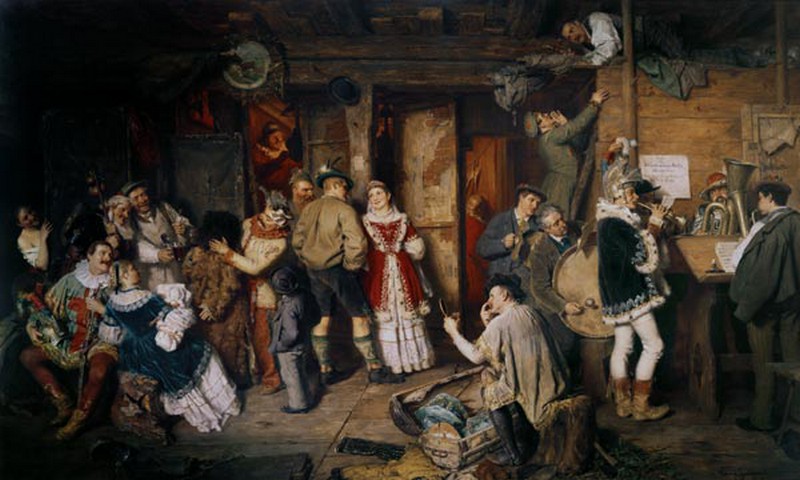
At the end of the second book, the Count’s equerry arrives at the lodge where Wilhelm and the rest of people are staying. The Count is waiting for Prince’s visit to his castle and, being keen on theatre, he thinks that Melina's company could be good entertainment for the Prince and the rest of the guests during their stay. The Count hires them, and Wilhelm, despite not being part of the company, doesn’t want to miss that opportunity to know more about nobility and also joins Melina's people. As he had promised Mignon, he takes her with him, and does the same with the harpist. All the second book characters are now on stage ready for this third book, set in the Count's castle. In addition to the Count and the Prince, Wilhelm will also meet the Countess, the Baron, the Baroness and a Gentleman, Jarno (the only one among the new characters whose name is revealed).
The second, last song of this third book (in chapter nine) is directly related to the actors. The Baron wrote the play in the Prince’s honour and deals with the actors as he considers himself an expert. He gives his opinion on every matter and obviously gets in their way. Besides, he shows favouritism towards some members of the company that upsets the others, and one day people begin to sing a song that makes fun of him.
Obviously, the Baron doesn't like it at all, but instead, the Count finds it really funny; he's convinced that the author of that song is his favourite actor and so he tells everybody (the Count, as well as the Baron, masters finesse and doesn't mind spreading around his preferences). The actor denies it to no avail and one night he's almost beaten to death.
As you would imagine, the Count gets very angry, and one day Mignon warns Wilhelm that Friedrich is about to be whipped as responsible for the beating. Do you remember Friedrich? He’s Philine's servant, in love with her and forever jealous of anyone approaching her. After his last episode of jealousy, he leaves Philine, and when he's captured wandering around the castle, it's not because he has beaten the actor but because he's looking for her. Wilhelm and the equerry persuade the Ladies of the castle of the boy’s innocence and the Ladies, in turn, persuade the Count to forgive him. Friedrich remains under Wilhelm protection, as Mignon and the harpist.
One more character, already mentioned, is involved in that story. Jarno is an officer, the Prince's right-hand man; he's really interested in Wilhelm and reproaches him that he's wasting his time with such a low class company and those lousy stage plays. Wilhelm doesn't know anything about Shakespeare and Jarno encourages him to read his plays, for which the young man is very grateful. Towards the end of their stay in the castle, Jarno tries that Wilhelm enlists the army and joins him, but he makes a huge mistake as he insults Mignon and the harpist. For Wilhelm, this is as insulting his own family and rejects Jarno's offer. From that moment, he sees him in a different light and comes to suspect, according to some evidences, that Juno ordered the actor’s beating. Wilhelm despises him for nearly killing the poor man and allowing the young Friedrich to be accused.
Few composers wrote the song dedicated to the Baron, probably because it is not sung by any main character (in fact, we don't know who sings it) and because it's a taunt, nothing to do with the harpist's sorrow or Mignon's delicacy. Out of the two versions, by Hugo Wolf and Artur Rubinstein, we are listening to the one of Hugo Wolf, Spottlied, performed by Dietrich Fischer-Dieskau and Daniel Barenboim.
Ich armer Teufel, Herr Baron,
Beneide Sie um Ihren Stand,
Um Ihren Platz so nah dem Thron
Und um manch schön' Stück Ackerland,
Um Ihres Vaters festes Schloß,
Um seine Wildbahn und Geschoß.
Mich armen Teufel, Herr Baron,
Beneiden Sie, so wie es scheint,
Weil die Natur vom Knaben schon
Mit mir es mütterlich gemeint.
Ich ward, mit leichtem Mut und Kopf,
Zwar arm, doch nicht ein armer Tropf.
Nun dächt ich, lieber Herr Baron,
Wir ließen's bleiben wie wir sind:
Sie blieben des Herrn Vaters Sohn,
Und ich blieb' meiner Mutter Kind.
Wir leben ohne Neid un Haß,
Begehren nicht des andern Titel,
Sie keinen Platz auf dem Parnaß,
Und keinen ich in dem Kapitel.
I poor devil, Lord Baron,
Must envy you your crest of arms,
The coach you ride in, coat you’ve on,
Your copses, ponds, and rack-rent farms,
Your father’s polish’d ashlar house,
And all his hounds and hares and grouse.
Me poor devil, Lord Baron,
You envy my small shred of wit;
Because it seems, as things have gone,
Old Nature had a hand in it;
She made me light of heart and gay,
With long-necked purse, not brain of clay.
Look you now, dear Lord Baron,
What if we both should cease to fret,
You being his Lordship’s eldest son,
And I being mother Nature’s brat?
We live in peace, all envy chase,
And heed not which o’ th’ two surpasses;
I in the Herald’s Books no place,
You having none about Parnassus.
(translation by Thomas Carlyle)














Comments powered by CComment